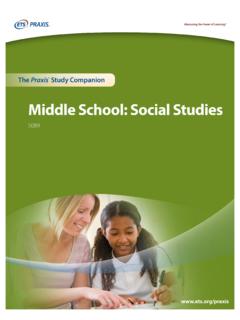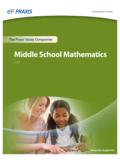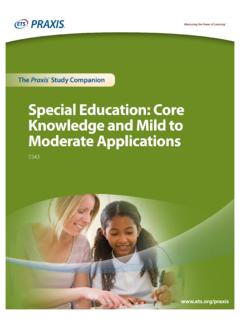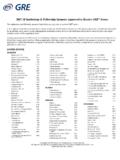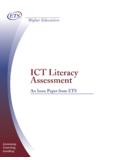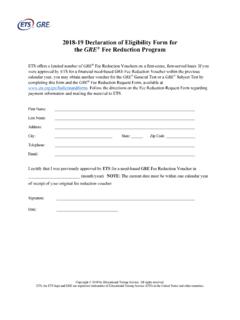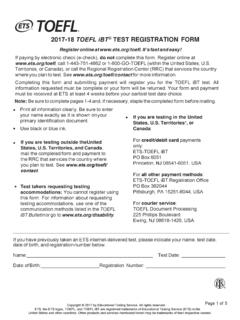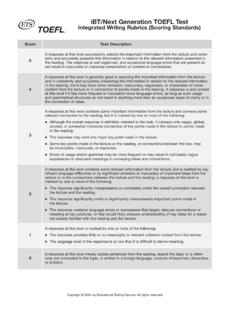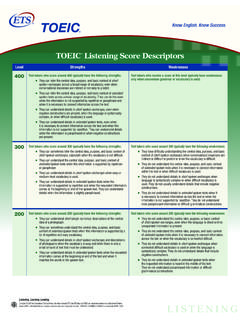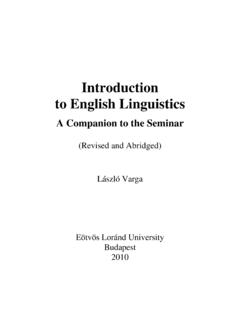Transcription of ParaPro Assessment - ETS
1 ParaPro Assessment Praxis study Companion2 The Praxis study CompanionWelcome to the Praxis study CompanionWelcome to the Praxis study companion Prepare to Show What You KnowYou have been working to acquire the knowledge and skills you need for your teaching career. Now you are ready to demonstrate your abilities by taking a Praxis test. Using The Praxis Series study companion is a smart way to prepare for the test so you can do your best on test day. This guide can help keep you on track and make the most efficient use of your study study companion contains practical information and helpful tools, including: An overview of the Praxis tests Specific information on the Praxis test you are taking A template study plan study topics Practice questions and explanations of correct answers Test-taking tips and strategies Frequently asked questions Links to more detailed informationSo where should you start?
2 Begin by reviewing this guide in its entirety and note those sections that you need to revisit. Then you can create your own personalized study plan and schedule based on your individual needs and how much time you have before test in mind that study habits are individual. There are many different ways to successfully prepare for your test. Some people study better on their own, while others prefer a group dynamic. You may have more energy early in the day, but another test taker may concentrate better in the evening. So use this guide to develop the approach that works best for teaching career begins with preparation. Good luck!Know What to ExpectWhich tests should I take? Each state or agency that uses the Praxis tests sets its own requirements for which test or tests you must take for the teaching area you wish to you register for a test, confirm your state or agency s testing requirements at are the Praxis tests given?
3 Praxis tests are given on computer. Other formats are available for test takers approved for accommodations (see page Praxis study CompanionWelcome to the Praxis study CompanionWhat should I expect when taking the test on computer?When taking the test on computer, you can expect to be asked to provide proper identification at the test center. Once admitted, you will be given the opportunity to learn how the computer interface works (how to answer questions, how to skip questions, how to go back to questions you skipped, etc.) before the testing time begins. Watch the What to Expect on Test Day video to see what the experience is and when are the Praxis tests offered?You can select the test center that is most convenient for you. The Praxis tests are administered through an international network of test centers, which includes Prometric Testing Centers, some universities, and other locations throughout the schedules may differ, so see the Praxis Web site for more detailed test registration information at The Praxis study Companion4 Table of ContentsTable of ContentsThe Praxis study companion guides you through the 10 steps to success1.)
4 Learn About Your Test ..5 Learn about the specific test you will be taking2. Familiarize Yourself with Test Questions ..8 Become comfortable with the types of questions you ll find on the Praxis tests3. Practice with Sample Test Questions ..12 Answer practice questions and find explanations for correct answers4. Determine Your Strategy for Success ..19 Set clear goals and deadlines so your test preparation is focused and efficient5. Develop Your study Plan ..22 Develop a personalized study plan and schedule6. Review Smart Tips for Success ..26 Follow test-taking tips developed by experts7. Check on Testing Accommodations ..28 See if you qualify for accommodations that may make it easier to take the Praxis test8. Do Your Best on Test Day ..29 Get ready for test day so you will be calm and confident9.
5 Understand Your Scores ..31 Understand how tests are scored and how to interpret your test scoresAppendix: Other Questions You May Have ..33 The Praxis study Companion5 Step 1: Learn About Your Test1. Learn About Your TestLearn about the specific test you will be takingParaPro Assessment (1755)Test at a GlanceTest Name ParaPro AssessmentTest Codes 1755 Time hoursNumber of Questions 90 Format Selected-response questions; use of a calculator is not permittedTest Delivery Computer delivered Approximate Approximate Content Categories Number of Percentage of Questions Examination I. Reading 30 33 % II. Mathematics 30 33 % III.
6 Writing 30 33 %IIIIIIA bout This TestThe ParaPro Assessment for prospective and practicing paraprofessionals measures skills and knowledge in reading, mathematics, and test consists of 90 selected-response questions across the three subject areas of reading, mathematics, and writing. Approximately two-thirds of the questions in each subject area focus on basic skills and knowledge, and approximately one-third of the questions in each subject area focus on the application of those skills and knowledge in a classroom test may contain some questions that do not count toward your Praxis study Companion6 Step 1: Learn About Your TestI. ReadingA. Reading Skills and KnowledgeReading Skills and Knowledge questions measure the examinee s ability to understand, interpret, and analyze a wide range of text.
7 Questions are based on reading passages as well as graphs, charts, and tables drawn from a variety of subject areas and real-life situations. The questions assess the examinee s ability to:1. Identify the main idea or primary purpose2. Identify supporting ideas3. Identify how a reading selection is organized4. Determine the meanings of words or phrases in context5. Draw inferences or implications from directly stated content6. Determine whether information is presented as fact or opinion7. Interpret information from tables, diagrams, charts, and graphsB. Application of Reading Skills and Knowledge to Classroom InstructionReading Application questions are typically based on classroom scenarios in which students are involved in reading-related tasks, such as reading assigned passages or working on vocabulary development.
8 Some questions concern foundations of reading: the knowledge and skills students need when they are learning the basic features of words and written text. These questions assess the examinee s ability to help students:1. Sound out words ( , recognize long and short vowels, consonant sounds, rhymes)2. Break down words into parts ( , recognize syllables, root words, prefixes, suffixes)3. Decode words or phrases using context clues4. Distinguish between synonyms, antonyms, and homonyms5. Alphabetize wordsOther questions are concerned with tools of the reading process: common strategies used in classrooms before, during, and after reading to aid students reading skills. These questions assess the examinee s ability to:1. Help students use prereading strategies, such as skimming or making predictions2.
9 Ask questions about a reading selection to help students understand the selection3. Make accurate observations about students ability to understand and interpret text4. Help students use a dictionary5. Interpret written directionsII. MathematicsA. Mathematics Skills and KnowledgeThe Math Skills and Knowledge questions assess the examinee s knowledge of mathematical concepts and ability to apply them to abstract and real-life situations. The test questions do not require knowledge of advanced-level mathematics vocabulary. Examinees may not use categories of math skills are tested:1. Number Sense and Basic Algebraa. perform basic addition, subtraction, multiplication, and division of whole numbers, fractions, and decimalsb. recognize multiplication as repeated addition and division as repeated subtractionc.
10 Recognize and interpret mathematical symbols such as +<> ,,,,d. understand the definitions of basic terms such as sum, difference, product, quotient, numerator, and denominatore. recognize the position of numbers in relation to each other ( , 13 is between 14 and 12)f. recognize equivalent forms of a number (..,eg 224=)Topics CoveredRepresentative descriptions of topics covered in each category are provided Praxis study Companion7 Step 1: Learn About Your Testg. demonstrate knowledge of place value for whole numbers and decimal numbersh. compute percentagesi. demonstrate knowledge of basic concepts of exponents (..,eg 224=, 2 2222164= =)j. demonstrate knowledge of order of operations (parentheses, exponents, multiplication, division, addition, and subtraction)k.
